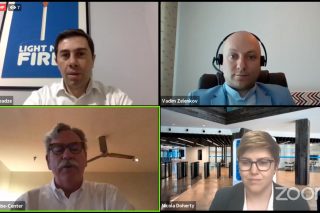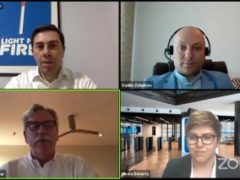
StrategEast hosted online panel on Remote education in the wake of pandemic
Most educational institutions switched to distance learning during the pandemic. What are the advantages and disadvantages of the remote system? What legacy in the field of distance education does the pandemic leave? These issues were discussed with education experts on our StrategEast Live session.
The Panel Moderator Horton Beebe-Center, President Emeritus of Eurasia Foundation, set the tone for the discussion on vocational education with a quote from the Institute for the Future report, “85 per cent of the jobs that will exist in 2030 haven’t even been invented yet.”
Answering the question of what modern remote education should primarily teach, Irakli Kashibadze, CEO of GoAndGrow.ge and future Laboratory Georgia, former head of the Georgian Innovation and Technology Agency noted that the period of pandemic demonstrated that besides knowledge, soft skills are becoming increasingly important. It is soft skills, and not theoretical knowledge that allow both people and organizations to become more adaptive, which is absolutely necessary during the pandemic, when the situation changes very quickly.
Vadim Zelenkov, EPAM Systems, Director, Training and Development, expanded Mr. Kashibadze’s idea, noting that the most important soft skill is the ability to learn effectively. “We need to teach our students the principle of lifelong learning. In projects such as our joint initiative with StrategEast – IT HUB Tbilisi, we urge our students to start a completely new professional life.”At the same time, according to Mr. Zelenkov, the transition to online learning faces certain difficulties due to human nature peculiarities: “Our task is to create good learning experience, introduce it in online education. We cannot replace analogue learning with technology, even while using artificial intelligence. We still need considerable human efforts.”
Nicola Doherty, Head of Higher Education EMEA & LATAM, LinkedIn, noted the lag of the traditional education system, especially the state one, from the new realities. “Over the past 15 years, LinkedIn has gone from a communication platform to the educational system. And that was our response to a user request. Today they want to study constantly. Traditional educational institutions, including the state educational system, simply cannot keep up with these changes and cannot offer an answer to such a request,” Ms. Doherty explained. At the same time, she offered a prospect: “But the pandemic has made changes to the states’ plans for education. Unexpectedly, what was the plan for the next 10 years became the plan for the next 2 months.”
Mr. Zelenkov expressed a general preference for the role of the state in online education: “Online education needs a lot of infrastructure. And now it is up to the states to provide this infrastructure. And we, commercial companies, relying on this infrastructure, will be able to educate a large number of students online. And with the onset of the pandemic, governments realized this.”
